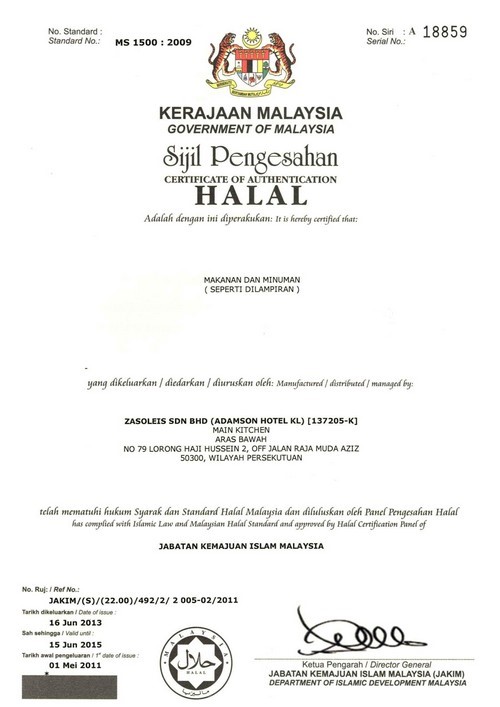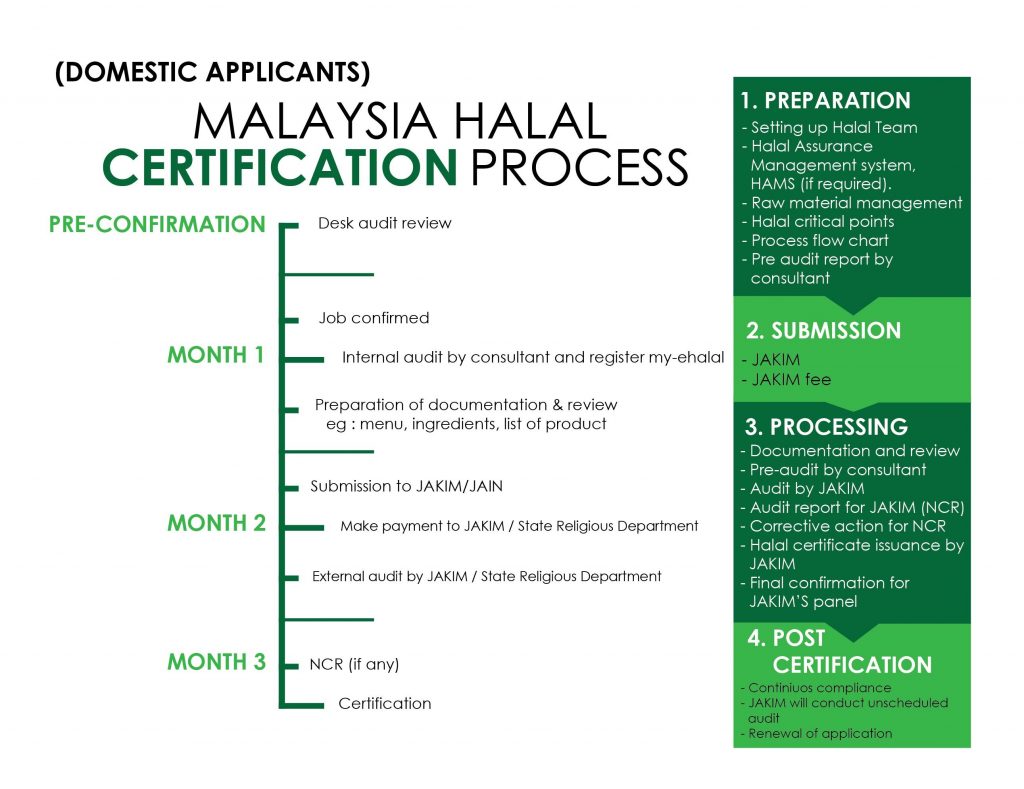by Nur Atikah binti Meor Rosli
Mass media is a medium or platform to reach large number of audiences. It can be divided into two categories namely electronic media which involves film, television, radio as well as recorded music, and print media which involves newspapers, books, pamphlets and comics. With the advancement of technology, media can be categorized as digital media that involves internet and mobile mass communication which provide services of mass media, i.e. emails, websites, blogs, and internet-based radio and television. There are several functions of media – it helps us interpret the past and encourages us to change what is necessary rather than stick to the status quo. We can learn technology by adopting new information from different sources of media as it has the ability to explain things that human beings are not able to which includes Halal certification towards basic needs of human being.
Halal certification in Malaysia is issued by the Department of Islamic Development Malaysia and Islamic religious council of each state. Competent authority is the best tool in determining a product is genuine. Moreover, Malaysia has received several awards as the implication of Halal certification on food products. Although some suppliers do not provide the logo but most of the products are certified by JAKIM. The food products with Halal logo is produced to meet the Halal dietary requirements, standards, procedures and guidelines to be followed. This is also supported by (Sheikh Abdul Aziz, 2015) stated that, in order to ensure the halalness of each product, it is important to educate the industries on the concept of the “halalan thoyyiban” aspects which are related to the safety, nutritional content and aesthetic appeal of halal products. As Muslim, consumers need to seek for a product that is produce in compliance to Syariah which is based on the Quran and Sunnah as well as the Malaysian law.
Although, there are platforms with the information of Halal certification given but people are still confuse and questioning the importance of Halal. The major reasons that people should know about the Halal certification is that the cleanliness and purity of the process to produce the products and the existence of the logo is not just for Muslim but it is applicable for everyone because we need to consume product that is wholesome and healthy as well as free cruelty to animals and no harm to the environment. Previously, there were few cases involve with exploiting the Halal logo which form a huge confusion among Malaysians. One of the issue is that, both Vivian – Lee May Ling, 29 and Alvin – Tan Jye Yee, 30 have been arrested and fined due to the ‘Bak Kut Teh” posting on Facebook – July 3, 2013. They were charged with posting religiously insensitive pictures, inciteful content and pornographic pictures. The photo shows them eating ‘Bak Kut Teh’, a non-halal delicacy, with the greeting “Selamat Berbuka Puasa” and a halal logo. The picture went viral and sparked anger among Malaysians especially the Muslim society as they realized that ‘Bak Kut Teh’ is forbidden in Islam. Thus, they were charged under Section 4(1)(c) of the Sedition Act 1948, fined RM5,000.00 or imprisonment up to 3 years or both. The confusion will not be developed if the knowledge of Halal being implemented by human. This is because the Halal certification provide countless benefits and it is guarantee that the products are safe and clean for consumers.
Nevertheless,
people today are aware with the usage of Halal logo and they have strong demand
on the products because they claimed that the product with the certification is
much more healthier and safer compare to product without the Halal certification.
It is also supported by (R, M., Nasir &
Chiew, 2010)where
they stated that, Non-Muslim
Russians made purchases from Muslim stores because they believe the products
are fresh, safe and infection- free, and had confidence that Muslims would adhere. It is also
supported by (Othman, Shaarani
& Bahron, 2017) that. the emphasis on quality as well as hygiene and food safety
is not necessarily something that really halal. Although the products are
certified with Halal logo but it does not ensure that the product is safe to be
consumed. Based on Surah Al-Baqarah in
verse 168: O mankind, eat from whatever is on earth [that is] lawful and good
and do not follow the footsteps of Satan. Indeed, he is to you a clear enemy. The
statement above is supported by (Abd Rahim, Mohd Mansor, Yakob, & Ismail, September
2018) mentioned that, it is clear
that places great emphasis on Allah SWT viewed about the cleanliness in
everything including the quality of handling food from raw material until it is
ready to be consumed.
Halal logo can be associated with hygiene and food safety and it is clear that “Bak Kut Teh” is not suitable and forbidden for Muslims because of the procedure of slaughtering the animal which does not follow the Quran and Sunnah. The statement above is supported by (Ahadith, n.d.) from chapter 5, Surah Al-Mai’idah (The Table Spread with Food) mentioned in verse 3. Forbidden to you(for food) are: Al-Maytatah(the dead animals-cattle-beast not slaughtered), the blood, the flesh of swine and the meat of that which has been slaughtered as sacrifice for others than Allah, or has been slaughtered for idols, etc., or on which Allah Name has not been mentioned while slaughtering and that which has been killed by strangling, or by a violent blow, or by a headlong fall, or by the goring of horns – and that which has been (partly) eaten by a wild animal – unless you are able to slaughter it(before its death) – and that which is sacrificied (slaughtered) on An-Nusub(stone altars).


Moreover, according to (Amran, 2018), JAKIM has identified and recognized Halal bodies worldwide – namely Austria, Argentina, Bangladesh, Belgium, Bosnia, Brunei, Kanada, Chile, Egypt, Perancis, Jerman, Indonesia, Iran, Ireland, Italy, Kazakhstan, Kenya, Maldives, Maghribi, Poland, Singapura, Korea Selatan, Sepanyol, Sri Lanka, Switzerland, Taiwan, Thailand, Arab Emiriah Bersatu (UAE) and Vietnam. Based on the above locations, it can be explained that Halal food or products have significant impact on Halal food entrepreneur and contributes to the country’s economy. This shows that people are more interested to purchase products with Halal recognition. According to Ustaz Amin from Masjid Tunku Mizan, UiTM Shah Alam, Malaysia based on his islamic perspective – Respecting each other is an advised attitude in Islam. Each and every Muslim in the world who have faith towards Allah SWT should have respect to Muslims and non-Muslims as well. The differences between cultures becomes a challenge but it has its own silver lining. We should take the benefit from the differences that we have to become more mature. The statement above was taken from Surah Al-Hujurat verse 13 which states, “O mankind! We have indeed created you from male and female, and have made you nations and tribes that you may know one another. The noblest of you, in the sight of Allah, is the best in conduct. Allah is Knower, Aware.”

The power of media is that people are able to provide and influence others with fake information through advertisement, pictures and messages. Nowadays, the content can be associated with implicit elements which does not affect the audience’s perception and behaviour immediately but if the medium is being used to encourage and provide genuine information especially towards Halal certification, people would be able to live a healthy life style without feeling doubtful. The government agency also plays an important role to ensure the product is verified so that we can educate and produce more Halal products worldwide.
References
Abd Rahim, S. A., Mohd Mansor, S. K., Yakob, M. A., & Ismail, N. (2018). FOOD SAFETY, SANITATION AND PERSONAL HYGIENE IN FOOD HANDLING: AN OVERVIEW FROM ISLAMIC PERSPECTIVE. International Journal of Civil Engineering and Technology (IJCIET), Volume 9, Issue 9, pp. 1524–1530.
Retrieved from http://www.iaeme.com/MasterAdmin/UploadFolder/IJCIET_09_09_148/IJCIET_09_09_148.pdf
Ahadith, Q. &. (n.d.). AYATS RELATED TO HALAL FOODS FROM QURAN E KAREEM. Halal Guider.
Retrieved from http://www.halalguider.com/page.php?sluge=QuranAhadith%20about%20Food
Amran, S. N. (2018). JAKIM IKTIRAF 66 BADAN PENSIJILAN HALAL LUAR NEGARA. Kuala Lumpur: Berita Harian Online.
Retrieved from https://www.bharian.com.my/berita/nasional/2018/02/388093/jakim-iktiraf-66-badan-pensijilan-halal-luar-negara
Othman, B., Shaarani, S. M., & Bahron, A. (2017). The influnce of knowledge, attitude abd sensitivity to government policies in halal certification process on organizational performance. Journal of Islamic Marketing.
Retrieved from https://www.researchgate.net/publication/304280352_THE_EFFECT_OF_HALAL_REQUIREMENT_PRACTICES_ON_ORGANIZATION_PERFORMANCE_AMONG_FOOD_MANUFACTURES_IN_MALAYSIA
R, F. G., M., Z., Nasir, M., & Chiew, E. (2010). Non-Muslim perception awarness of halal principle and related food products in Malaysia. International Food Reserach Journal 7 .
Retrieved from http://psasir.upm.edu.my/id/eprint/11717/1/NonMuslims_awareness_of_Halal_principles.pdf
Sheikh Abdul Aziz, D. W. (2015). MANUAL PROCEDURE FOR MALAYSIA HALAL CERTIFICATION (THIRD REVISION)2014. Putrajaya: Department of Islamic Development Malaysia.
Retrieved from http://www.halal.gov.my/v4/images/pdf/protocol%20halal%20meat%20poultry.pdf